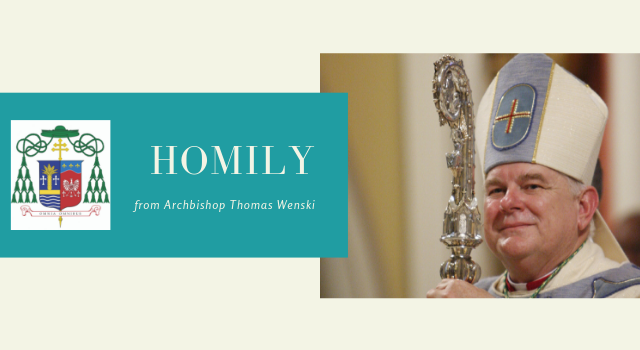By Archbishop Thomas Wenski - The Archdiocese of Miami
Archbishop Thomas Wenski preached this homily at the funeral Mass for Father William Muñiz, which was celebrated Aug. 7, 2020 at St. Henry Church in Pompano Beach.
Today, we lay to rest Father William Muñiz. We extend our condolences to his wife, Olga, his three sons and their wives and to his grandchildren. We also extend our condolences to the parishioners here at St. Henry’s and to all those who feel the loss of his passing from this earth.
As a Catholic priest for more than 25 years, Father Muñiz celebrated the Holy Sacrifice of the Mass which is, for each one of us, a pledge of future glory. God is faithful and so we commend his soul to the Lord confident that in his mercy Christ will welcome him into the company of the saints in heaven and seat him at table in the Heavenly Banquet. It is the same Lord whom he adored, hidden in the sacred host under the appearance of bread, whom he sees now face to face.
Father Muñiz began his faith journey within the Episcopal Church. Like St. Henry Cardinal Newman and other members of the Anglican Communion, he swam the Tiber and entered into full communion with the Catholic Church. As a former minister in the Episcopal Church for 27 years, he asked to continue ministry within the Catholic Church and was ordained a Catholic priest under the terms of the Pastoral Provision. He was for this reason something of a rarity — a married priest. He served here in the Archdiocese of Miami as a counselor with Catholic Charities at St. Luke’s Center, as a chaplain with Holy Cross Hospital and as parochial vicar at Our Lady Queen of Martyrs, St. Helen's, and most recently here at St. Henry’s, where he began a vibrant Hispanic ministry.
A priest is called not only to offer the Sacrifice but to make sacrifice the condition of his life. Even becoming a Catholic also meant no little sacrifice for him and his wife. Leaving the Episcopalians was not a step he took lightly but he took it because he believed it a necessary step if he was to remain faithful to the Lord and the power of his grace.
In doing so, he did not reject what was good and holy within that ecclesial community — for it was there that he first knew Jesus Christ. He came to believe what we Catholics believe — that the Church that Christ founded subsists in the Catholic Church united cum Petro and sub Petro — with Peter and under Peter.
Ut unum sint — that they may be one — was the prayer Jesus prayed the night before he died. As we lay Father Muñiz to rest, we should continue to pray and work to heal the divisions that still rend the Body of Christ. May all who invoke the name of Jesus seek to grow closer to him and to the extent that we do, we will grow closer to each other.
Los Padres del Concilio Vaticano Segundo dijeron: “En realidad, el misterio del hombre no se aclara de verdad sino en el misterio del Verbo encarnado... Por consiguiente, en Cristo y por Cristo, se ilumina el enigma del dolor y de la muerte, que, fuera, de su Evangelio, nos aplasta.” (Gaudium et Spes #22)
Nuestra fe en Cristo nos lleva a profesar la inmortalidad y la bienaventuranza eterna. Así lo hacemos en esta celebración eucarística, como escribió san Pablo a los Corintios: "Los muertos resucitarán incorruptibles y nosotros seremos transformados" (1 Co 15, 52). Esto es un misterio, que nos envuelve y que aceptamos por la fe. No intentemos racionalizarlo; no intentemos entenderlo con lógica humana; más bien vivámoslo inmersos en este mismo misterio.
Demos, pues, gracias a Dios "que nos da la victoria por medio de nuestro Señor Jesucristo" (1 Co 15, 57); y pidamos por nuestro hermano William, para que, libre de sus culpas y guiado por el buen Pastor, pueda gozar de los pastos eternos. El acontecimiento de su muerte nos anima a vivir siempre para el Señor: "Si vivimos, vivimos para el Señor; si morimos, morimos para el Señor; así que, ya vivamos ya muramos, somos del Señor" (Rm 14, 8). Pues para esto murió y resucitó Cristo: "para ser Señor de muertos y vivos"(Rm 14, 9).
The Paschal Candle stands at the head of the coffin at every Mass of Christian burial just as it stands by the font at baptisms. Five grains of incense represent the five wounds of Christ. Those five grains in the form of a cross are framed by the Greek letters, Alpha and Omega, symbolizing Christ — our beginning and our end. When the candle is lit after the blessing of the new fire on Holy Saturday evening, the priest prays: "May the light of Christ, rising in glory, dispel the darkness of our hearts and minds." The words of St. Paul comfort us: "If we have died with Christ, we believe that we shall also rise with him."

